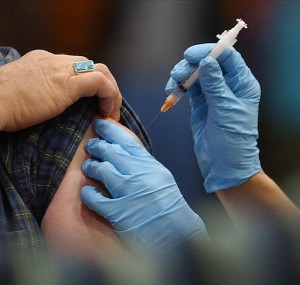
As flu season approaches, many individuals are getting vaccinated in hopes of avoiding a bout of influenza that could take them out of work and leave them feeling miserable for days. If you’re procrastinating, a new study by Canadian researchers may motivate you to finally get to the vaccination clinic. According to the study, getting a flu shot could help you avoid not just the flu, but a heart attack as well.
This is yet another contrast to the many myths that flu vaccines seem to be subject to. For example, scientists have frequently explained that it is impossible to catch the flu from a vaccine, yet many people still consider it to be possible. The myth that only elderly people can die of the flu is another dangerous thing to assume. For example, the vast majority of swine flu deaths occur in people younger than 65.
50% Reduction in Heart Attack and Stroke Risk
During the Canadian study, cardiologist Dr. Jacob Udell and other researchers at the University of Toronto examined four existing studies that included over 3,000 individuals with an average age of 60. Some of the participants had heart disease in the past, while others were free of heart disease. The participants were divided into three groups, with one receiving a flu vaccination, one receiving a placebo and one receiving no injection at all. The participants were then tracked for a single year.
Exactly 187 of the participants experienced a stroke or heart attack over the course of this year, and 65 of these individuals died. Overall, the researchers found that the subjects in the flu vaccine group cut their risk of a stroke or heart attack in half. These same subjects were also 40% less likely to die from a stroke or heart attack.
The results were the same regardless of whether the subjects had a history of experiencing cardiovascular events in the past.
Why Does the Flu Shot Reduce Cardiovascular Risk?
So far, scientists are unsure as to exactly why the flu shot reduces heart attack risk, or produce such other remarkable reductions in cardiovascular risk. However, Udell theorizes that for a person with heart disease, a sudden change in health — such as a reduction in oxygen levels that occurs during a battle with influenza — could serve as the “straw that broke the camel’s back” in initiating a heart attack or stroke.
Udell suggests that since the flu vaccine prevents influenza, it also prevents the reduction in oxygen that comes along with it. Further, Udell says it’s possible that the flu vaccine breaks up plaque that creates clogs in the arteries.
Other researchers, including cardiologist Dr. Sarah Samaan of Baylor Heart Hospital, believe that the flu shot may reduce cardiovascular risk because it reduces inflammation. During a bout with the flu, inflammatory substances become more prevalent in the blood stream. This leads to blood vessel inflammation, which can subsequently trigger a heart attack.
According to Samaan, cholesterol plaques found in the blood vessels become unstable in the presence of inflammation. These plaques are then at a greater risk of developing tiny fissures, which can lead to the formation of blood clots. If the clot is in a blood vessel that leads to the brain, a stroke can result, just as a heart attack could be the outcome if the blood clot develops in a vessel leading to the heart.
A Massive Step Forward in Cardiovascular Medicine?
According to Udell, a 50% reduction in heart attack and stroke risk — particularly when it results from something as inexpensive and immediately accessible as a flu shot — is huge news for the medical community. He said that the findings would be important and have the potential to save many lives even if the flu shot only resulted in a 10% reduction in cardiovascular risk. Udell hopes to begin a larger study in the near future to confirm that a flu shot reduces heart attack risk.
The Bottom Line
Getting a flu vaccine could reduce your risk of having a stroke or heart attack by up to 50%, according to a new study conducted at the University of Toronto. The findings of the study, which have yet to be published in a medical journal, were presented on October 28th at a conference held by the Canadian Cardiovascular Congress.













